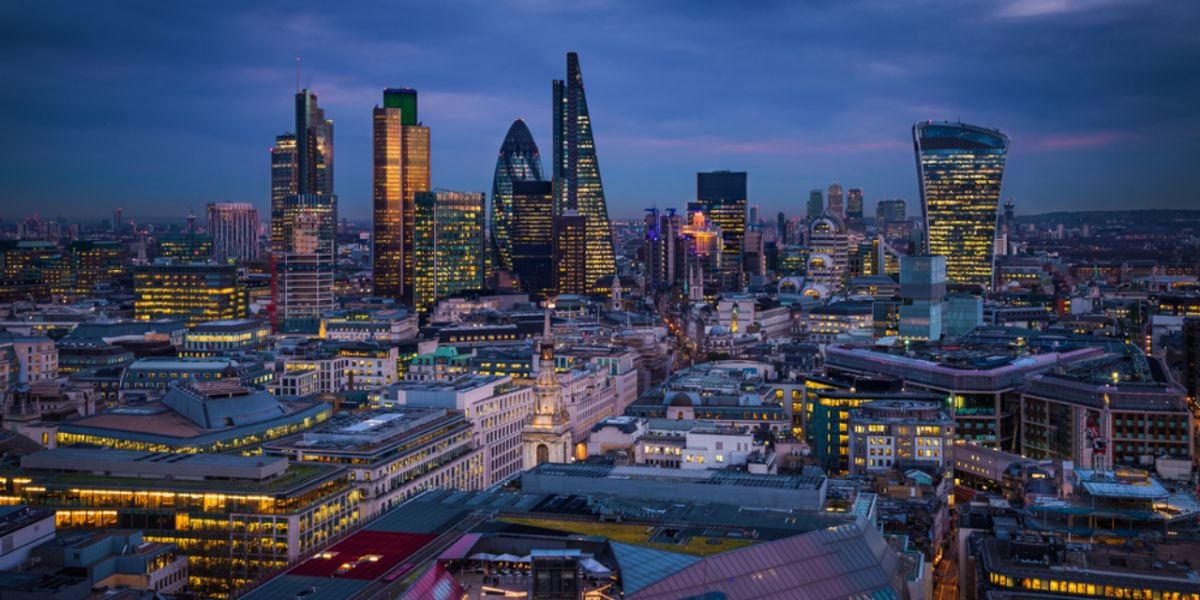
London's job market is one of the most competitive and diverse in the world, attracting talent from across England and internationally. This guide covers everything you need to know about finding work in the capital, from understanding key employment sectors and salaries to navigating the application process, acing interviews and adapting to London's professional culture.
The labour market in London
London's job market is highly competitive and is known to attract international job seekers, recent graduates and people from across the UK who are drawn to the capital's opportunities.
Despite challenges including the European financial crisis, Brexit and the COVID-19 pandemic, London's labour market remains robust. As of 2025, the unemployment rate stands at 5.7%, a jump from 3.9% just two years ago, with an average of 33.4 working hours per week. Many firms are piloting four-day workweek approaches, giving employees greater flexibility to balance work and personal commitments.
Promising sectors in London
Financial services
Historically, London's strongest sector has been financial services, which encompasses banking, investment, underwriting, and trading. While Brexit has reduced the number of positions, the industry continues to seek highly skilled talent. Major employers include Goldman Sachs, HSBC, Barclays, NatWest and CitiGroup. Most graduate schemes require a 2:1 degree classification.
Hospitality
The London hospitality industry took a big hit in recent years, and employers have been trying to retain talent. Benefits such as mental health, well-being days and health insurance have been reviewed to ensure the sector attracts skilled professionals.
Higher education
One cannot speak about London's biggest employers without mentioning the capital city's higher education institutions. These contribute to London's economy by several billion pounds yearly. The jobs aren't only directly linked to the universities per se (e.g., academics, admissions staff, caretakers, etc.); thousands of satellite jobs are also created due to needs arising from a large student community. Thus, businesses such as cafeterias, restaurants, convenience stores, community partnerships, etc., open and offer employment to many.
Check out The Uniijobs for a list of vacancies available by higher education institutions.
Other growing sectors
Fashion, technology, healthcare, media, pharmaceuticals, tourism and legal services all offer strong opportunities. London Fashion Week, held twice yearly, provides excellent networking opportunities for fashion professionals.
If you want to work in a startup, the startup environment in London is very active, and entrepreneurs are always searching for talented people to shape their teams.
London's salaries and cost of living
Pay growth in London remains modest, even though London salaries are higher than anywhere else in the UK. When deciding to work in London, it is a good idea to be aware of the cost of living associated with the city to ensure you can live a decent life.
As of 2025, a Londoner's average weekly salary is £838.90, which is by far the highest of any region in the country.
The Living Wage Campaign, launched in 2011, calculates pay rates based on actual living costs. London's living wage is £13.85, which is notably higher than the UK living wage (£12.60) to reflect the capital's elevated costs.
The job search in London
Expats in London have an excellent opportunity to land their ideal job due to the city's diverse job market. London welcomes people from across the globe and attracts global investments in sectors like banking, finance, healthcare, education, and engineering. However, it is essential to know that London is highly competitive for job seekers since many aspire to establish their careers here.
Before starting to dream about your professional life in London, it's essential to know whether your field of expertise and interest is actively present in the city.
Is there growth potential in London, or is your sector dying out due to political, economic, and technological developments? A career decision, which includes moving from one country to another, should be well-informed and based on the principle that it will have lasting impacts.
Finding a position that matches your career goals and skill set in a highly competitive place like London requires confidence, self-awareness, and patience. Whereas sometimes luck plays its role too, the harder you work towards your goals and the more informed you are about the job market in London, the better chances you stand of setting the ground for a bright career in London.
Online search
Now that you have established the current condition of your sector, you can start dedicating a couple of hours per day to your job search, which will most likely be taking place online.
However, you may wonder where to start, as various job seeker platforms exist. It's common to go directly to some of the most popular pages, such as LinkedIn and Indeed, but we would like to bring to your attention smaller, yet more local, destinations to help with your job search. Expat.com hosts a London jobs section where you can upload your CV and be open to new opportunities or contact regarding already posted job offers.
With platforms like Indeed and Gumtree, you can browse jobs by sector, location, salary band, and type of contract. The more filters and keywords you apply to your search, the better chances you have to find jobs that are right for you.
Based in Covent Garden, Reed.co.uk has supported England's job market since 1995. If you register, you will receive job alerts directly to your email. You can also manage your applications and create a visible and searchable profile. Total Jobs is another UK-dedicated jobs site that advertises positions across 55 sectors, from healthcare, transport, and logistics to charity, education, and media.
The government has a dedicated website for vacancies all over the country. Even though you can search for jobs freely and navigate the different sectors and positions, you need to create an account and sign in to apply for a position.
Good to know:
If you are passionate about serving the public, search for civil service jobs in different departments (education, health, defence, environment, etc.) on the government's dedicated page.
Useful links:
Find a job on the government's website
Networking
Networking is crucial in London's job market. Many positions are filled internally or through referrals before being publicly advertised. To build your professional network:
- Join the Expat.com forum to share job-hunting experiences, discuss work culture and exchange advice with other expats.
- Attend the London Job Show, an annual free event in October offering direct access to employers across all levels, from entry-level to senior executive positions. The event includes career advice seminars on topics like using social media in job searches and interview skills.
- For younger job seekers (ages 14 to 24), Skills London is a two-day event in November each year, which connects young people with employers through interactive activities.
Recruitment agencies
Whether you are looking for an entry-level job to pay your bills, a temp position to support you during your studies in London, or your dream job, recruitment agencies have worked for thousands of candidates. Search for the right agency depending on your sector and your ideal location to work in London, as different agencies tend to specialise in various industries and cover other regions.
However, before deciding to assign your job search to an agent, note that there might be some hindrances to the process. For example, the agency may not have understood the role well, encouraging you to apply for an irrelevant job. Or, the agent may not have briefed you correctly, and you may be surprised during the interview.
To achieve good results, make sure that you communicate your expectations to the agency and ask as many questions as needed to elicit the right amount of information about a company and a position.
Useful links:
Working arrangements in London
Post-pandemic, fully remote work has decreased by 21.5%, though technology companies and startups still offer this option. Hybrid working has become standard in many London organisations, allowing employees to balance office social interaction with flexible arrangements for personal commitments.
The application process
The only connection between you and the employer at the time of your application is through your CV and cover letter. Thus, if you wish to impress and showcase how you are different from every other candidate they have come across, make sure to send a sophisticated CV and a sincere yet spirited cover letter.
See below a few tips on how to sell your skills, value and achievements to London companies through a London-style CV:
- Tailor your CV and cover letter to each specific position, addressing the responsibilities and requirements directly.
- Keep your CV to two A4 pages maximum, completely free from typos and grammatical errors.
- Have a fluent English speaker review your documents before submission.
- Submit as a PDF rather than a Word document.
- Include your name, email and phone number.
- Do NOT include a photo, date of birth, religion or marital status.
- Specify your UK work eligibility or visa requirements.
- Highlight language skills and international experience - these are valuable assets.
- Name your document "CV," not "resumé".
Good to know:
Most London companies are keen on receiving spontaneous applications when they have no specific vacancies, so don't hesitate to write to them with your CV and cover letter attached.
Job interviews in London
Londoners are very time-conscious, and they appreciate punctuality, which may explain why they are always in a rush. It is a good practice to arrive about ten minutes earlier at the interview location so that you have enough time to present yourself to the front desk and be guided to the relevant department.
Your interviewer expects to meet someone who has background knowledge of the company, experience in the industry and is willing to undertake new challenges.
Common interview questions
“Tell me about yourself.”
To successfully answer this seemingly straightforward question, remember not to fall into the trap of getting too personal and emotional. The interviewers aren't interested in your childhood, and the relationship you have with your partner, nor are they curious about your favourite ice cream flavour.
What they are trying to find out is whether your education is relevant to the role, how much professional experience you have in the industry, and why you are interested in this particular field and the company.
“What are your weaknesses?”
We all have flaws we are aware of, and with this question, your interviewers would like to see that you are not only conscious about your imperfections, but you are also working on improving them. For example, if your weakness is public speaking, they would like to hear that you are performing public speaking with every given opportunity to practice.
Why are you the best candidate for this role?
To answer this question, emphasise your skills and personality traits, and demonstrate how you stand out among the other applicants. To complete your answer, give a couple of examples from previous work experiences that prove your qualities, and explain how you will apply them on the job. It's important to focus on how you will add value to the company rather than on why you want this job.
“What are your salary expectations?”
This question may put you on the spot during the interview, so prepare your answer in advance. Do your research about the average salary paid in London for this role, and give a broad answer (e.g., 'I am looking for a starting salary between £30,000 and £35,000.')
“Where do you see yourself in five years?”
Again, this is not a question about your travel aspirations and personal goals. Demonstrate your passion for a career in the industry, and focus on the company's vision and how it matches your professional ambitions.
Good to know:
No matter how well you prepare for your interview, it's possible to come across a question that you struggle with. If your mind goes completely blank, ask for a moment to think about it, and compose the answer in your head before you verbalise it.
Interview etiquette
Londoners are very professional in their work environment and like to keep it this way, except when in the pub drinking beers with their colleagues on a Friday after-work night. To ensure that you don't overstep professional boundaries during the interview, keep in mind the following don'ts.
Don't underestimate body language
Your body language can say a lot about whether you feel good about yourself, or you are uncomfortable and insecure; whether you are interested in the conversation, or you are not engaged mentally. To make a good impression on your interviewers, sit up straight in your chair and avoid slouching at all costs, as it is considered rude. Also, don't break eye contact with your interviewers, as you will automatically lose the connection with the speaker. Look your interviewers in the eyes to show that you are actively listening to what they are saying, and don't hesitate to smile, as it puts both sides at their ease.
Never badmouth your previous employer
Criticising your ex-boss, even if you have a point, reflects negatively on you, as you risk coming across as a complainer. No one wants to have a hater in their team who is only focusing on the problems rather than the solutions and is generally against change and innovation.
Don't ask anything regarding annual leaves, sick pay and salary
As discussed in our How to build your network in London article, money is generally a taboo subject for Londoners. Within an interview context, salary and holidays should not be mentioned by the interviewee by any means, as the topic gives the impression that the person is lazy and money-oriented.
Don't ask about social connections at work
The social culture of a company is quite important, as everyone wants a friendly and collaborative working environment. However, it's not a good idea to ask your interviewers how often the team goes to the pub and whether workplace dating is acceptable. Instead, you may ask about the size of your team, the dress code, etc.
Questions you shouldn't be asked
The Equality Act 2010 was designed to legally protect people from discrimination based on race, religion, age or sex. Thus, there are inappropriate questions that interviewers aren't allowed to ask during a job interview, as the answers may be used to discriminate against the candidate. It's often hard to tell whether the employer is just having a conversation or has bad intentions, so familiarise yourself with the questions you shouldn't be asked to be able to stand up for your rights.
You shouldn't be asked about your:
Race, religion, or native language
Note that questions about your origins are different from the question about your eligibility to work in the UK, which is acceptable. Also, as long as your level of English is evidently to the required standard for the role, English doesn't have to be your first language to get hired in London.
Your employer must not consider your nationality or accent as detrimental to your ability to perform well in the role.
Marital status, children, and family plans
Questions covering these topics are too personal, and they can also be used to determine a person's sexual orientation.
Date of birth
Your date of birth can be asked for when you fill in the Equality Monitoring Form; however, the person selecting and interviewing the candidates shouldn't be informed about your age.
Health and disabilities
Health issues should only be discussed if the employer wants to determine whether the candidate can carry out the role, or whether adjustments must be made for the candidate's needs to be accommodated (e.g., disabled access).
Criminal convictions
If the sentence has been spent, the candidate isn't obliged to disclose criminal convictions, unless they relate to the role.
Important:
Potential employees in education, childcare, and healthcare must undertake criminal records checks (CRB checks) by the Disclosure and Barring Service (DBS) before the interview.
Useful links:
Equality and Human Rights Commission
Equality Advisory & Support Service
Advisory, Conciliation and Arbitration Service
After the interview
There are several things to do after a job interview in London to increase your chances of being invited to a second interview or offered the job.
Londoners appreciate thank-you notes and kindness in general, so there's no doubt that your interviewers will expect you to send a follow-up email expressing your gratitude for the invitation to the interview and thanking them for their time.
You may not get the job, but at least you are making a good impression, and your name might be considered for a future job opening.
If you are not offered the job, think of the preparation time as a good investment for future interviews you will get. Now you know what kind of questions London companies ask, and you can improve your weak areas, so you perform better at the next interview.
Also, it's acceptable to contact the HR department and ask for feedback.
Work culture in London
London's work culture blends professionalism with diversity and flexibility. While many companies maintain formal structures, especially in finance and law, others, like startups and creative industries, embrace flatter hierarchies and collaborative environments.
Professionalism
Punctuality and communication are key when working in London. Londoners value being on time and prefer polite, indirect communication, especially when giving feedback. Professionalism is expected, but office environments are generally friendly and respectful.
Work-life balance
Hybrid work and flexible hours are common, though some sectors like finance and legal services still expect long hours. Employees are increasingly encouraged to use their annual leave and maintain a healthy boundary between work and personal life.
Diversity and inclusion
London workplaces are among the most diverse in the UK, often reflecting the multicultural makeup of the city. Most employers take inclusion seriously, with diversity policies, unconscious bias training, and employee networks (e.g., for LGBTQ+ staff, ethnic minorities, parents, and carers) playing a key role in workplace culture. Multilingual teams are common, and international experience is often viewed as a strength.
Office social life
Workplace socialising is a big part of London culture, especially in more traditional office-based sectors. Pubs are common spots for after-work drinks, and team lunches or social outings are often part of company culture.
However, participation is usually optional, and there is growing awareness around inclusion and accommodating non-drinkers or those with caregiving responsibilities.
Workplace etiquette
Punctuality is crucial: Being on time for meetings or appointments is expected.
Dress codes vary: Finance and law firms still require formal attire, while tech, media, and creative industries lean more casual.
Tea and small talk: Casual conversation, especially over tea or coffee, is common and often helps build rapport. Just avoid overly personal or controversial topics.
We do our best to provide accurate and up to date information. However, if you have noticed any inaccuracies in this article, please let us know in the comments section below.








